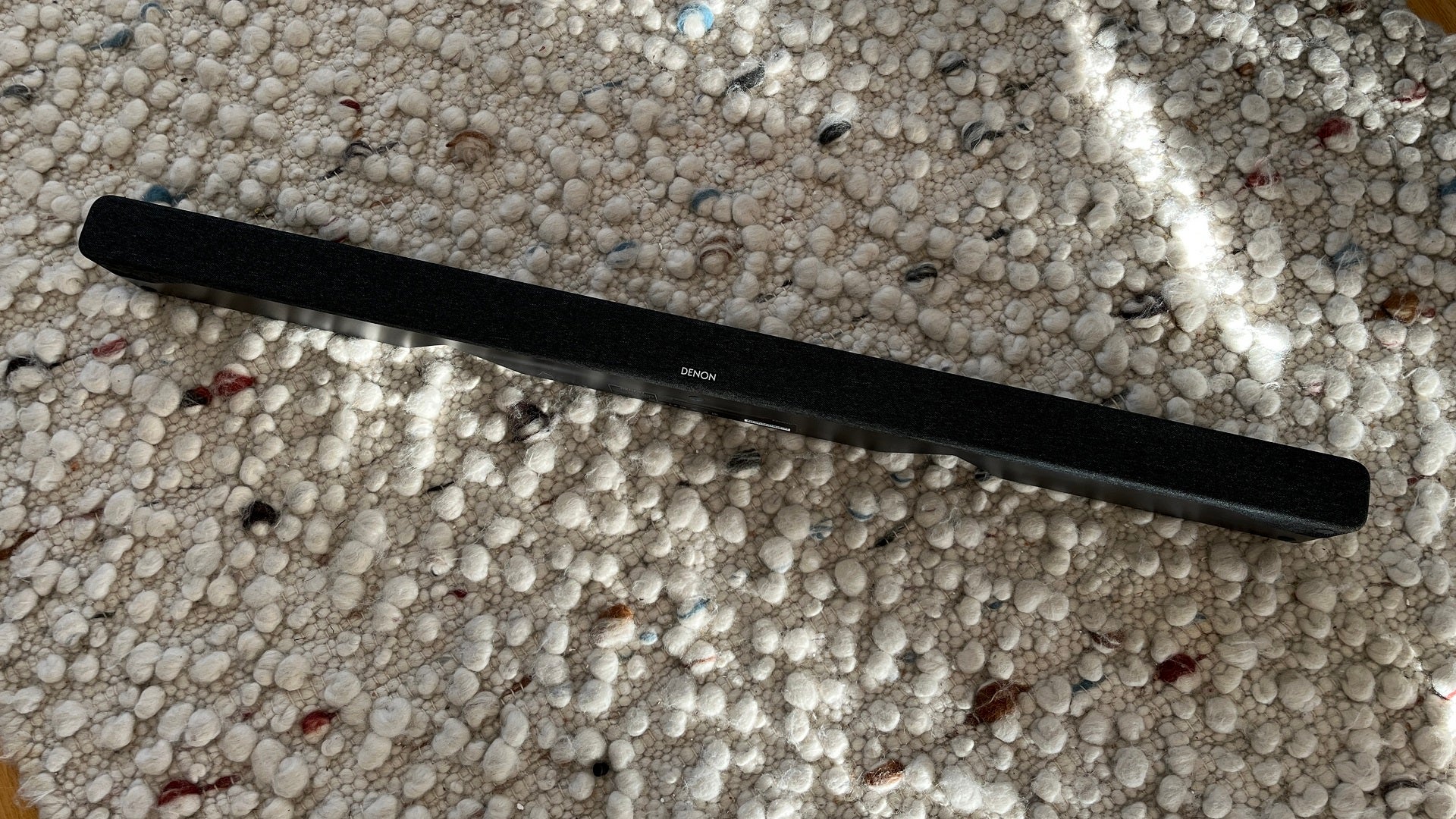Verdict
Very Good-looking (in an understated way) and great-sounding (up to a point), the Denon DHT-S517 has plenty to recommend it. It’s at loggerheads with its own subwoofer, though, and it’s not without credible competition…
Pros
- Large and well-organised sound
- Decent spec for the money
- Nicely made and properly finished
Cons
- Subwoofer does its own thing
- Not the most musical
- Doesn’t acknowledge Dolby Atmos every single time
-
AudioDolby Atmos 3.1.2 configuration -
BassWireless subwoofer with 15cm bass driver -
WirelessBluetooth wireless connectivity
Introduction
A 3.1.2 Dolby Atmos soundbar/wireless subwoofer system, for comfortably under £400, by a brand with nothing to prove? Seems like a no-brainer, doesn’t it?
And yet Denon has a scrap on its hands to turn the DHT-S517 into a success story – after all, some of the biggest hitters around (Sony and Sonos to name but two) have similarly priced soundbars available that want to do a similar job for you.
For the umpteenth time on this website then, it becomes apparent that a) nothing’s straightforward, and b) you’ve always got a choice to make.
Availability
- UKRRP: £379
- USARRP: $449
- EuropeRRP: €399
- CanadaRRP: CA$599
- AustraliaTBC
The Denon DHT-S517 is on sale now, and the official line is that it costs £379. Do just a little research though, and you’ll realise there’s no need to pay that much – cough up any more than £329 and you’re just not trying.
In the United States, meanwhile, you should expect to pay no more than $399, while in Australia consider AU$699 absolutely top whack.
Design
- 60 x 1050 x 95mm (soundbar)
- 370 x 172 x 290mm (subwoofer)
- Surface- or wall-mount (soundbar)
Discretion is a big part of the design brief where soundbars are concerned (unless you’re Bang & Olufsen), and the designer of the DHT-S517 hasn’t strayed. The soundbar is slim and unobtrusive – it’s a stripling 60 x 1050 x 95mm (HxWxD), so won’t look out of place in front of smaller TVs and won’t foul the bottom of their screen either.
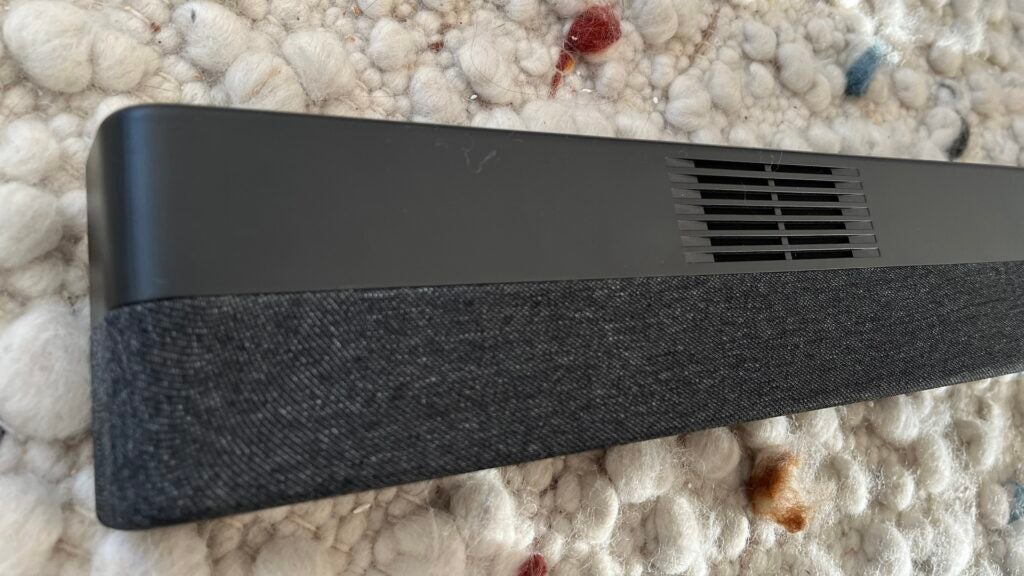
Or, at least, it won’t unless it’s one of those screens that tries to sit as close to the surface it’s standing on as possible. And the soundbar weighs just 2.5kg, too, so if you do decide to put it on the wall using its integrated keyhole mounting it should prove problematic.
The wireless subwoofer that accompanies it, meanwhile, is an equally trim 370 x 172 x 290mm. It connects wirelessly to the soundbar, so is happy enough to be positioned more-or-less anywhere that’s convenient – although it’s important to bear in mind it needs plugging into the mains.
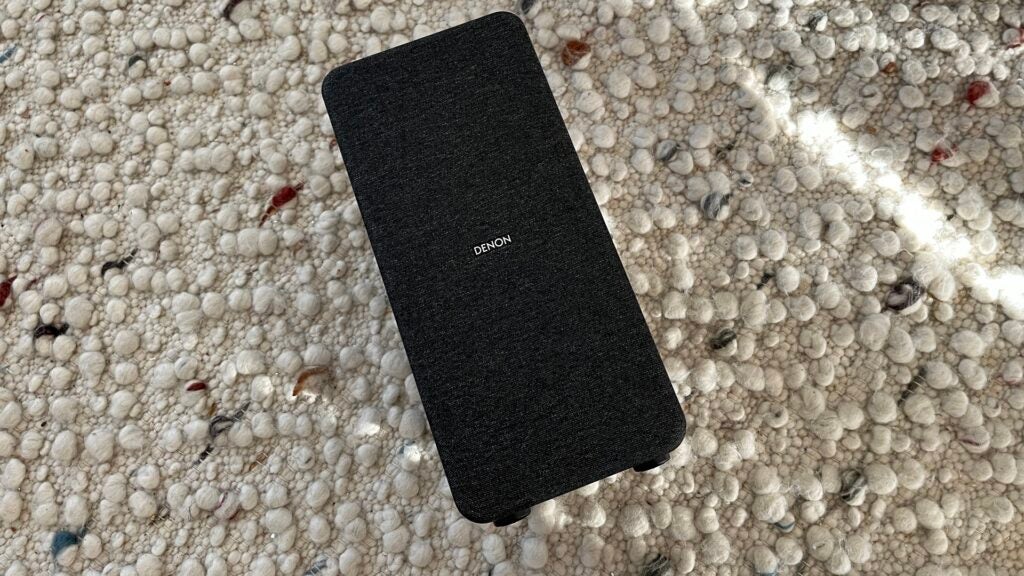
Both elements of the DHT-S517 are made almost entirely of plastic – which is not a criticism, you understand, merely an observation. Build quality is well up to the standard everyone expects from Denon, the finish is equally impressive – and the quantity of dark grey acoustic cloth that covers the business area of each speaker adds a little to the impression of quality and understated good taste.
Features
- 3.1.2 Dolby Atmos spatial audio
- eARC connectivity
- Wireless Bluetooth possibilities
The DHT-S517 wants to serve a 3.1.2 version of Dolby Atmos spatial audio soundtracks. Where the .1 is coming from is quite obvious: the wireless subwoofer is fitted with a forward-firing 15cm bass driver and a rear-venting bass reflex port. The amount of power that’s available to move the driver is, for some reason, not for public consumption.
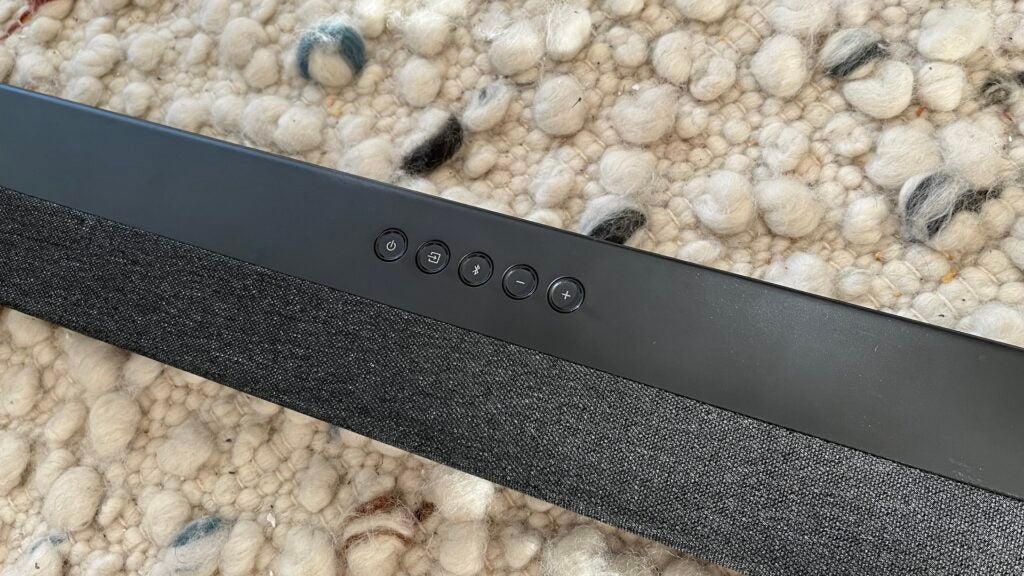
The 3.2 is the responsibility of the soundbar, of course. Denon has fitted it with a 25mm full-range driver positioned front-and-centre to take care of centre-channel duties, while at each end of the face there’s a 120 x 40mm racetrack midrange driver in tandem with a 25mm tweeter dealing with the left- and right-channel information.
On the top of the soundbar there are a couple of slatted grilles – behind each there’s a 66mm full-range driver, angled to best achieve some reflectivity and provide the sonic height that’s the whole Dolby Atmos party-piece.
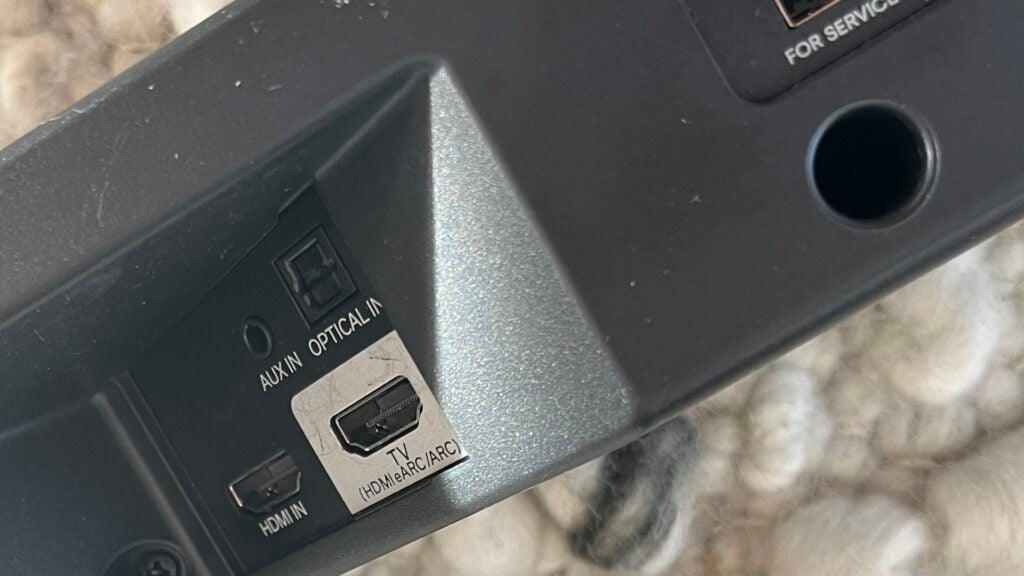
Getting the audio information on board in the first place can be achieved in a number of ways. Your best best (as far as spatial audio is concerned) is to use the eARC-enabled HDMI socket on the rear of the soundbar – it’s joined there by a second HDMI, a digital optical socket and a 3.5mm analogue input. There’s also a USB slot purely for servicing. Wireless connectivity is limited to Bluetooth.
The wireless connection between soundbar and subwoofer happens almost the moment they are both powered up, but in the unlikely event that they can’t find each other without assistance there’s a pairing button on the subwoofer’s rear panel.
Exerting control over the DHT-S517 is simple enough. The soundbar has some physical controls on its top, between the Atmos speaker grilles – here’s where you can deal with power on/off, volume up/down, Bluetooth pairing and input selection.

You’ve also the option of the bundled remote-control handset – it’s nothing special to look at or to hold, but it covers all the controls already mentioned, and has a few more besides. Mute is available, as is an independent bass level control. There’s no facility to adjust the crossover frequency between sub and soundbar, but you can at least balance their relative outputs.
There’s a midrange equivalent, called Dialogue Enhancer (select High, Med or Low), some EQ presets (Movie, Music and Night) and a Pure button that disables all the Denon’s clever audio processing and delivers music in true stereo.
The soundbar will let you know what’s what using a series of four little LEDs behind its acoustic cloth. Volume level, audio format and selected input are all revealed – once you’ve committed the meaning of different colours and different numbers of lights to memory, of course.
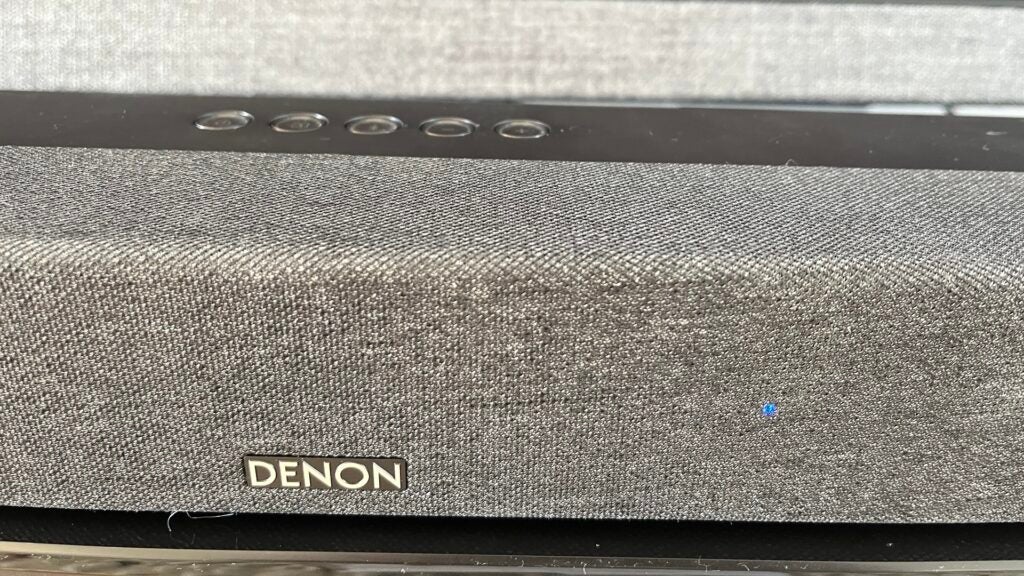
Sound Quality
- Open, spacious and well-organised sound
- Detailed, articulate soundbar
- Subwoofer isn’t so expressive
“It’s good, but…” is never the most encouraging way to begin a discussion of the way a speaker system performs, but here we are. The Denon DHT-S517 is good, but it’s not quite the complete solution.
Problems, such as they are, focus almost entirely on the subwoofer. It’s just not all that detailed when it comes to describing the bass stuff – so for all that it punches with real solidity and very decent control, there’s not an awful lot of variation in the sound it makes.
Dynamic headroom is all well and good – and this subwoofer has plenty, make no mistake – but without at least a hint of the light-and-shade that’s as present at the bottom of the frequency range as everywhere else, it’s less convincing than it otherwise would be.
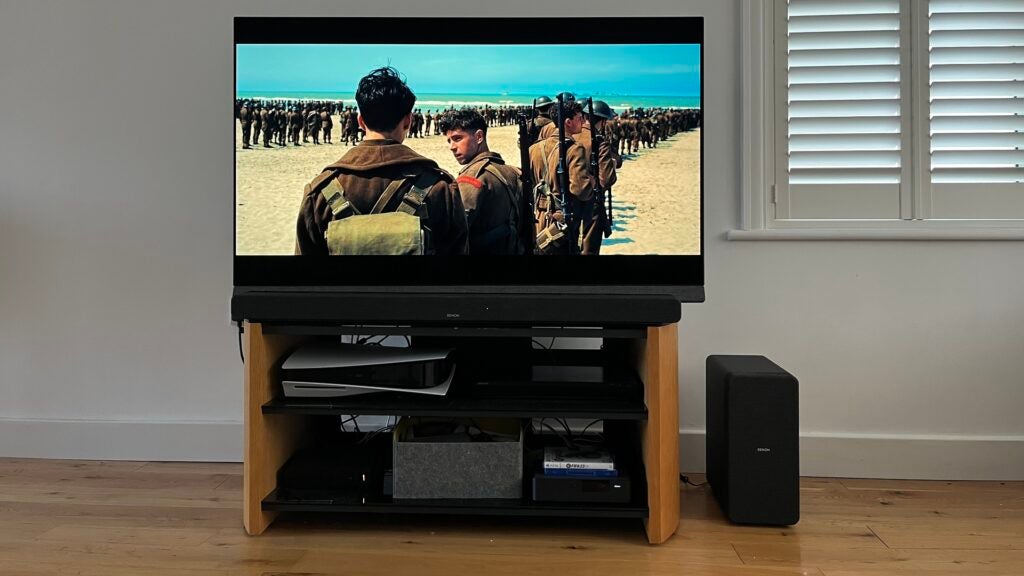
And it’s not on the best of terms with its partnering soundbar. A lack of crossover control isn’t an issue if the transition between the two speakers is nice and smooth, but here it simply isn’t. The point where audio ceases to be the soundbar’s responsibility and becomes the subwoofer’s problem is all too apparent.
Elsewhere, though, the Denon is a fair bit more accomplished. Its treble and midrange reproduction is altogether more detailed and revealing than its bass activity, and unless you’re rash with volume levels the top of the frequency range is a substantial, properly textured and nicely controlled listen.
The midrange is, if anything, even more impressive: voices project well, have a pocket of space in which to operate even if the soundtrack on the whole is kicking right off, and there’s plenty of textural detail retained and revealed.
The soundstage is worth praising too, both in terms of its scale and its organisation. The DHT-S517 is a far bigger listen than its physical dimensions might suggest, and lays out a wide, deep stage on which a movie soundtrack can do its thing. The height effect of Atmos soundtracks isn’t the most pronounced, it’s true… but it’s there, and it’s just as locked in place as everything else happening on the stage.
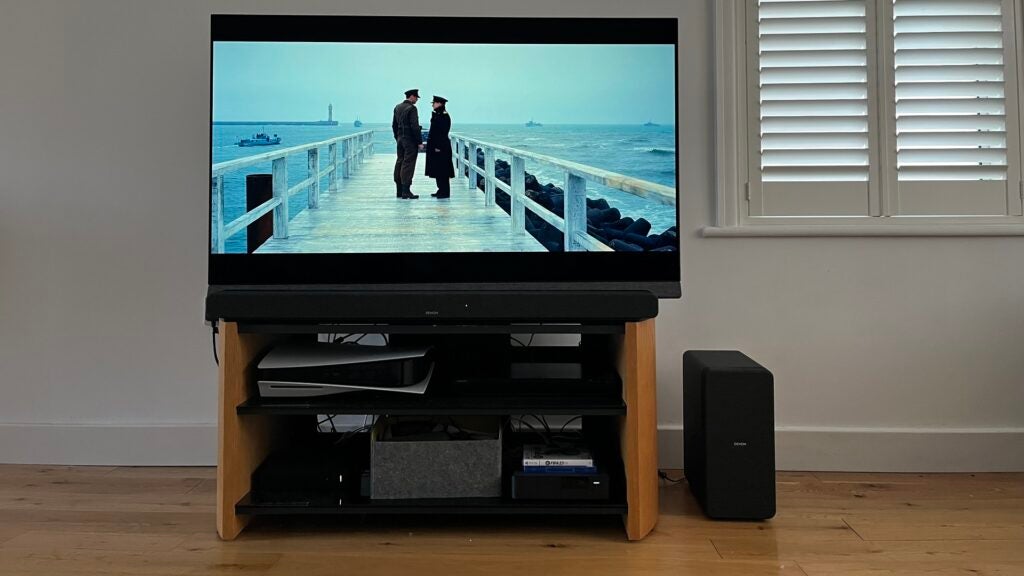
It’s worth noting here, though, that every now and then the Denon doesn’t recognise an incoming Dolby Atmos signal for what it is. So every now and then, it needs its HDMI cable unplugging and reattaching in order to get that cyan LED light that indicates an Atmos soundtrack to light up.
Effects steering is believable, the distance from left to right is significant, and the soundbar is just as happy to deal with big dynamic variants as it is exposing the more minor dynamic difference apparent in speech patterns or musical instruments.
Music, though, shakes the DHT-D517’s confidence a little. Its unity and positivity take a knock, and suddenly it’s apparent you’re listening to quite a number of individual speaker drivers rather than one consolidated loudspeaker. So timing in particular, and expressiveness in general, takes a bit of a hit.
Latest deals
Should you buy it?
You’re after a reasonably affordable, fuss-free facsimile of Dolby Atmos sound. The trade-off between pronounced Dolby Atmos effects and complete ease of use isn’t too great.
You find it hard to keep your expectations realistic. If you want a full-on sensation of sonic height it’s likely to cost a bit more than Denon wants for the DHT-S517.
Final Thoughts
No realistic customer is expecting the full Dolby Atmos fireworks from a system as affordable and compact as this one – and sure enough, a flavour is all you get. But nevertheless, its ease of use, its physical discretion and its brand-name carry it quite a long way, and the bulk of its sonic characteristics carry it further still. With a better-sorted subwoofer it would be an even stronger contender.
How we test
We test every soundbar we review thoroughly over an extended period of time. We use industry standard tests to compare features properly. We’ll always tell you what we find. We never, ever, accept money to review a product.
Find out more about how we test in our ethics policy.
Tested for more than a week
Tested with real world use
FAQs
Bass can be adjusted on the soundbar with the individual bass control on the remote.
Sustainability
Trusted Reviews’ holds the fact that global warming is not a myth as a core value and will continuously endeavour to help protect our planet from harm in its business practices.
As part of this mission, whenever we review a product we send the company a series of questions to help us gauge and make transparent the impact the device has on the environment.
We currently haven’t received answers to the questions on this product, but will update this page the moment we do. You can see a detailed breakdown of the questions we ask and why in our sustainability info page.
Jargon buster
Dolby Atmos
Dolby Atmos is an object-based audio format. It expands on 5.1 and 7.1 soundtracks by adding overhead channels. Sounds are referred to as “audio objects”, of which there can be up to 128 audio channels, and these ‘objects’ can be accurately positioned within a 3D soundscape. This allows soundtracks that support the technology to place sounds above and around the listener with compatible kit.
eARC
eARC (Enhanced Audio Return Channel) is the update to ARC and it boosts the bandwidth and speed, making room for object-based audio surround formats such as DTS:X and Dolby Atmos to be sent directly to an AV receiver/soundbar.
Verdict
Very Good-looking (in an understated way) and great-sounding (up to a point), the Denon DHT-S517 has plenty to recommend it. It’s at loggerheads with its own subwoofer, though, and it’s not without credible competition…
Pros
- Large and well-organised sound
- Decent spec for the money
- Nicely made and properly finished
Cons
- Subwoofer does its own thing
- Not the most musical
- Doesn’t acknowledge Dolby Atmos every single time
-
AudioDolby Atmos 3.1.2 configuration -
BassWireless subwoofer with 15cm bass driver -
WirelessBluetooth wireless connectivity
Introduction
A 3.1.2 Dolby Atmos soundbar/wireless subwoofer system, for comfortably under £400, by a brand with nothing to prove? Seems like a no-brainer, doesn’t it?
And yet Denon has a scrap on its hands to turn the DHT-S517 into a success story – after all, some of the biggest hitters around (Sony and Sonos to name but two) have similarly priced soundbars available that want to do a similar job for you.
For the umpteenth time on this website then, it becomes apparent that a) nothing’s straightforward, and b) you’ve always got a choice to make.
Availability
- UKRRP: £379
- USARRP: $449
- EuropeRRP: €399
- CanadaRRP: CA$599
- AustraliaTBC
The Denon DHT-S517 is on sale now, and the official line is that it costs £379. Do just a little research though, and you’ll realise there’s no need to pay that much – cough up any more than £329 and you’re just not trying.
In the United States, meanwhile, you should expect to pay no more than $399, while in Australia consider AU$699 absolutely top whack.
Design
- 60 x 1050 x 95mm (soundbar)
- 370 x 172 x 290mm (subwoofer)
- Surface- or wall-mount (soundbar)
Discretion is a big part of the design brief where soundbars are concerned (unless you’re Bang & Olufsen), and the designer of the DHT-S517 hasn’t strayed. The soundbar is slim and unobtrusive – it’s a stripling 60 x 1050 x 95mm (HxWxD), so won’t look out of place in front of smaller TVs and won’t foul the bottom of their screen either.

Or, at least, it won’t unless it’s one of those screens that tries to sit as close to the surface it’s standing on as possible. And the soundbar weighs just 2.5kg, too, so if you do decide to put it on the wall using its integrated keyhole mounting it should prove problematic.
The wireless subwoofer that accompanies it, meanwhile, is an equally trim 370 x 172 x 290mm. It connects wirelessly to the soundbar, so is happy enough to be positioned more-or-less anywhere that’s convenient – although it’s important to bear in mind it needs plugging into the mains.

Both elements of the DHT-S517 are made almost entirely of plastic – which is not a criticism, you understand, merely an observation. Build quality is well up to the standard everyone expects from Denon, the finish is equally impressive – and the quantity of dark grey acoustic cloth that covers the business area of each speaker adds a little to the impression of quality and understated good taste.
Features
- 3.1.2 Dolby Atmos spatial audio
- eARC connectivity
- Wireless Bluetooth possibilities
The DHT-S517 wants to serve a 3.1.2 version of Dolby Atmos spatial audio soundtracks. Where the .1 is coming from is quite obvious: the wireless subwoofer is fitted with a forward-firing 15cm bass driver and a rear-venting bass reflex port. The amount of power that’s available to move the driver is, for some reason, not for public consumption.

The 3.2 is the responsibility of the soundbar, of course. Denon has fitted it with a 25mm full-range driver positioned front-and-centre to take care of centre-channel duties, while at each end of the face there’s a 120 x 40mm racetrack midrange driver in tandem with a 25mm tweeter dealing with the left- and right-channel information.
On the top of the soundbar there are a couple of slatted grilles – behind each there’s a 66mm full-range driver, angled to best achieve some reflectivity and provide the sonic height that’s the whole Dolby Atmos party-piece.

Getting the audio information on board in the first place can be achieved in a number of ways. Your best best (as far as spatial audio is concerned) is to use the eARC-enabled HDMI socket on the rear of the soundbar – it’s joined there by a second HDMI, a digital optical socket and a 3.5mm analogue input. There’s also a USB slot purely for servicing. Wireless connectivity is limited to Bluetooth.
The wireless connection between soundbar and subwoofer happens almost the moment they are both powered up, but in the unlikely event that they can’t find each other without assistance there’s a pairing button on the subwoofer’s rear panel.
Exerting control over the DHT-S517 is simple enough. The soundbar has some physical controls on its top, between the Atmos speaker grilles – here’s where you can deal with power on/off, volume up/down, Bluetooth pairing and input selection.

You’ve also the option of the bundled remote-control handset – it’s nothing special to look at or to hold, but it covers all the controls already mentioned, and has a few more besides. Mute is available, as is an independent bass level control. There’s no facility to adjust the crossover frequency between sub and soundbar, but you can at least balance their relative outputs.
There’s a midrange equivalent, called Dialogue Enhancer (select High, Med or Low), some EQ presets (Movie, Music and Night) and a Pure button that disables all the Denon’s clever audio processing and delivers music in true stereo.
The soundbar will let you know what’s what using a series of four little LEDs behind its acoustic cloth. Volume level, audio format and selected input are all revealed – once you’ve committed the meaning of different colours and different numbers of lights to memory, of course.

Sound Quality
- Open, spacious and well-organised sound
- Detailed, articulate soundbar
- Subwoofer isn’t so expressive
“It’s good, but…” is never the most encouraging way to begin a discussion of the way a speaker system performs, but here we are. The Denon DHT-S517 is good, but it’s not quite the complete solution.
Problems, such as they are, focus almost entirely on the subwoofer. It’s just not all that detailed when it comes to describing the bass stuff – so for all that it punches with real solidity and very decent control, there’s not an awful lot of variation in the sound it makes.
Dynamic headroom is all well and good – and this subwoofer has plenty, make no mistake – but without at least a hint of the light-and-shade that’s as present at the bottom of the frequency range as everywhere else, it’s less convincing than it otherwise would be.

And it’s not on the best of terms with its partnering soundbar. A lack of crossover control isn’t an issue if the transition between the two speakers is nice and smooth, but here it simply isn’t. The point where audio ceases to be the soundbar’s responsibility and becomes the subwoofer’s problem is all too apparent.
Elsewhere, though, the Denon is a fair bit more accomplished. Its treble and midrange reproduction is altogether more detailed and revealing than its bass activity, and unless you’re rash with volume levels the top of the frequency range is a substantial, properly textured and nicely controlled listen.
The midrange is, if anything, even more impressive: voices project well, have a pocket of space in which to operate even if the soundtrack on the whole is kicking right off, and there’s plenty of textural detail retained and revealed.
The soundstage is worth praising too, both in terms of its scale and its organisation. The DHT-S517 is a far bigger listen than its physical dimensions might suggest, and lays out a wide, deep stage on which a movie soundtrack can do its thing. The height effect of Atmos soundtracks isn’t the most pronounced, it’s true… but it’s there, and it’s just as locked in place as everything else happening on the stage.

It’s worth noting here, though, that every now and then the Denon doesn’t recognise an incoming Dolby Atmos signal for what it is. So every now and then, it needs its HDMI cable unplugging and reattaching in order to get that cyan LED light that indicates an Atmos soundtrack to light up.
Effects steering is believable, the distance from left to right is significant, and the soundbar is just as happy to deal with big dynamic variants as it is exposing the more minor dynamic difference apparent in speech patterns or musical instruments.
Music, though, shakes the DHT-D517’s confidence a little. Its unity and positivity take a knock, and suddenly it’s apparent you’re listening to quite a number of individual speaker drivers rather than one consolidated loudspeaker. So timing in particular, and expressiveness in general, takes a bit of a hit.
Latest deals
Should you buy it?
You’re after a reasonably affordable, fuss-free facsimile of Dolby Atmos sound. The trade-off between pronounced Dolby Atmos effects and complete ease of use isn’t too great.
You find it hard to keep your expectations realistic. If you want a full-on sensation of sonic height it’s likely to cost a bit more than Denon wants for the DHT-S517.
Final Thoughts
No realistic customer is expecting the full Dolby Atmos fireworks from a system as affordable and compact as this one – and sure enough, a flavour is all you get. But nevertheless, its ease of use, its physical discretion and its brand-name carry it quite a long way, and the bulk of its sonic characteristics carry it further still. With a better-sorted subwoofer it would be an even stronger contender.
How we test
We test every soundbar we review thoroughly over an extended period of time. We use industry standard tests to compare features properly. We’ll always tell you what we find. We never, ever, accept money to review a product.
Find out more about how we test in our ethics policy.
Tested for more than a week
Tested with real world use
FAQs
Bass can be adjusted on the soundbar with the individual bass control on the remote.
Sustainability
Trusted Reviews’ holds the fact that global warming is not a myth as a core value and will continuously endeavour to help protect our planet from harm in its business practices.
As part of this mission, whenever we review a product we send the company a series of questions to help us gauge and make transparent the impact the device has on the environment.
We currently haven’t received answers to the questions on this product, but will update this page the moment we do. You can see a detailed breakdown of the questions we ask and why in our sustainability info page.
Jargon buster
Dolby Atmos
Dolby Atmos is an object-based audio format. It expands on 5.1 and 7.1 soundtracks by adding overhead channels. Sounds are referred to as “audio objects”, of which there can be up to 128 audio channels, and these ‘objects’ can be accurately positioned within a 3D soundscape. This allows soundtracks that support the technology to place sounds above and around the listener with compatible kit.
eARC
eARC (Enhanced Audio Return Channel) is the update to ARC and it boosts the bandwidth and speed, making room for object-based audio surround formats such as DTS:X and Dolby Atmos to be sent directly to an AV receiver/soundbar.


















